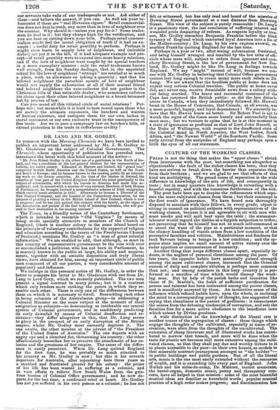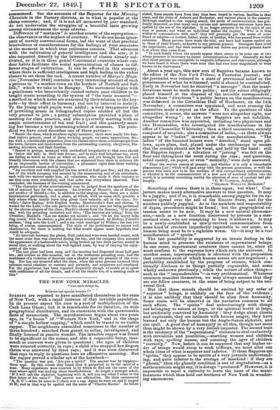CULTURE OF THE WORKING CLASSES.
PRIDE is not the thing that makes the "upper classes" shrink from intercourse with the poor, but something not altogether so objectionable : the fault of the richer classes has been, that they have not striven to break down the barrier that separates them from their brethren ; and we are glad to see that efforts of that kind are multiplying. The grand cause of separation is the wide difference in knowledge of the arts of life, and consequently in taste ; but in many quarters this knowledge is extending with a hopeful rapidity, and with the conscious furtherance of the rich. The poor have been apt to despise the refinements which sepa- rate the more cultivated classes, from them ; but their contempt is the first result of ignorance. We have heard men thoroughly disposed to associate with their fellows, in every grade, object to sitting in council on political subjects with representatives of the working classes, because it is not agreeable to sit with men who must smoke and will spill beer upon the table : the statesman- labourer would regard the dislike as a foppish subjection to trifles; not perceiving that he himself has not so much self-command as to annul the want of the pipe at a particular moment, or that the clumsy handling of viands arises from a low condition of the perceptive faculties and volition. Maladroitness and fondness for rank flavours belong to beings in a low condition; and the op- posite state implies no small amount of active victory over the ruder appetites or circumstances of humanity.
Another thing that keeps different classes apart, especially in- doors, is the neglect of personal cleanliness among the poor. Of late years, the opposite habits have materially gained strength among the more cultivated classes, insomuch that the Oriental custom of daily and complete ablution is perhaps more common than not; and among numbers in this busy country it is per- formed at a sacrifice of time which would dismay the work- ing man. But by help of the parish baths and laundries like those of St. Martin's, the habit of sufficient purification for person and raiment has been insinuated among the poorer classes, and is manifestly accepted by them. An instinctive sense of the influence which refined habits have, upon the whole, in inclining the mind to a corresponding purity of thought, has suggested the saying that cleanliness is the parent of godliness : it emancipates the senses from the debasing tendencies of corruption, and sets the faculties free for a more active obedience to the beneficent laws which subsist by Divine goodness.
A wide distinction in the knowledge of the liberal arts is another source of the segregation of classes : those things which engage the thoughts of the cultivated, especially at times of re- creation, were alien from the thoughts of the uncultivated. The extension of cheap literature and of illustrated works has contri- buted to narrow that breach, and more will be done when the taste for plastic art becomes still more extensive among the culti- vated classes, so that they shall pay due and worthy tribute to it in places accessible to the poor—in their own houses, as models to that miserable contract-journeyman amongst us "the builder "— in public buildings and public gardens. But of all the liberal arts, music is the one most easily extended without the resources of wealth, and it is extending into every part of England. John Hullah and his aides-de-camp, Dr. Mainzer, tourist musicians, the barrel-organ, domestic music, penny and threepenny con- certs, have all helped in that mission: some of the most beautiful musical ideas are familiar as household words; popular musical practice of a high order makes progress; and discrimination has commenced. See the accounts of the Reporter for the Morning Chronicle in the Factory districts, as to what is popular at the cheap concerts; and, if it is not all measured by your standard, do not undervalue the struggles of a beautiful taste growing among circumstances the most adverse.
Difference of "manners" is another source of the segregation— the observance or the neglect of courtesy. We do not mean ignor- ance of merely conventional forms, but the want of that practical benevolence or considerateness for the feelings of your associates at the moment in which true politeness consists. That advances with the cultivation of general intelligence and the arts ; it is also imparted directly by the intercourse of classes already cul- tivated, as it is in those genial Continental countries where out- door habits facilitate the social approximation of classes in dif- ferent stages of cultivation. It can be effected in this country, where there is sufficient intelligence and high feeling in the richer classes to set them the task. A recent number of Sharpe's Maga- zine [November 1849] contains a very interesting account of such a process in "a market-town on the borders of Norfolk and Suf- folk," which we take to be Bungay. The movement began with gentleman who benevolently caused certain poor children to be taught music according to the system of "the tonic numeral"— a method in which notes are measured by their relation to the key- note—by their effect in harmony, and not by interval in melody. To the young adult pupils were added ; a very inexpensive plan of providing music in lithographed copies enabled all but the very poorest to join ; a penny subscription provided a place of meeting for class practice, and also a quarterly meeting with an ample entertainment of tea and fruit ; and this quarterly meet- ing has become a very interesting school of manners. The perio- dical we have cited describes one of these parties— "Beside the class, which numbers eighty members, there were nearly two hun- dred visiters present, most of them working people, servants, apprentices, &c.; but with a considerable proportion from the classes above them,—tradespeople from the town, farmers and landowners from the surrounding country, clergymen, Dis- senting ministers, and their families.
"Seated in groups, arranged with methodical irregularity so that none should be below the salt, in their best dresses, and in their best behaviour too, every one feeling as much at home as when at home, and yet brought into free and friendly, intercourse with the classes that are separated from them in ordinary life by an impassable barrier of convention; a pleasanter sight than these working people presented cannot well be imagined.
"An excellent and well-supplied tea was served at half-past five ; and the com- fort of the whole company was secured by the unassuming zeal of six attendants, each with two waiters under him, all volunteers, who made it their business to see that none were overlooked, and that order was everywhere observed. This concluded, the business of the evening commenced. "The character of the entertainment may be judged from the specimen of the bill of musical fare for the occasion. An overture of Mozart's, one of Bishop's, and another of Shield's,—for, in addition to the singing-class, there are a dozen instrumental performers, and a piano, at which, with no mean skill, presides a lady whose whole family have long given their valuable aid in the class; No- vello's Salve Regina,' with English words; Mendelssohn's duet and chorus, I waited for the Lord,'—the solo parts in this and in every case not being performed by the chorus-singers of the class; Haydn's chorus from the Seasons, '0 be graci- ous,' with the preceding recitative and trio; The heavens are telling,' from the Creation; Handel's Let me wander not unseen'; and Or let the merry bells ring round,' with its chorus; a glee and chorus accompanied, by Bishop; Purcell's anthem, Sing unto the Lord'; and a six-voice madrigal by Wilbye ; the last two being, of course, unaccompanied. The style of the performance we cannot well characterize, for there is nothing but what would appear mere hyperbole that would be adequate.
"At intervals between the pieces, fruit, cake, and wine were handed round, with the same order that was observed during the tea; and the company then assumed the appearance of a fashionable soiree, being broken up into little parties, seated in social chat, or walking about the well-lighted room, by way of varying the enjoy- ment of the hour.
"The last piece had been sung and the meeting had dispersed about half-past ten; and neither on this occasion, nor on the numerous preceding ones, had the semblance of a violation of decorum cast a shadow upon the pleasure of the even- ing. Nor has one occurred after the close, when the same persons resumed their common social relations as masters and servants, and employers and employed. For the experiment has been repeated frequently enough to enable us to speak with confidence of all the details, and of all the results too, of a meeting such as this.'



























 Previous page
Previous page